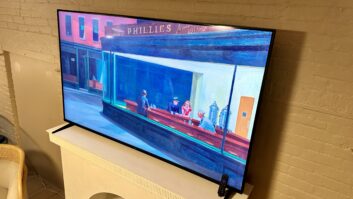Minneapolis – Best Buy is in talks to sell its ailing, mall-based Musicland music and video software group, comprised of some 1,200 Sam Goody, Suncoast and Media Play stores.
The company has hired an investment-banking firm to assist with the sale, as well as ‘additional professionals to assist in other areas of the plan,’ the retailer said.
In anticipation of the divestiture, Best Buy is reclassifying Musicland as a discontinuing business and is taking a $441 million charge against the operation. (For Best Buy’s most recent financial report, see p. 4.)
In making the announcement, Best Buy CEO Brad Anderson conceded that the company’s plan to use Musicland as a platform from which to sell consumer electronics through the shopping mall channel ‘has been less successful than we had hoped.’ Factors contributing to its failure included a ‘a continued slowdown in traffic in traditional shopping centers nationwide,’ he said, plus steep declines in CD sales.
Also undermining the strategy, Anderson said, was a misperception by consumers that Sam Goody’s digital products were over-priced, when in fact their retails were comparable to those of Best Buy’s. What’s more, Sam Goody lost some of its traditional customer base when it reduced its CD assortment, a tactic that had increased music sales and inventory turns when employed at Best Buy.
Anderson added that a strategic study begun several months ago concluded that Musicland ‘would not be capable of meeting our original expectations.’ Divesting the division would allow Best Buy to concentrate on its core business and assets, the company said.
‘In an effort to derive the best outcome for all of our constituencies – including our shareholders, employees, vendors, landlords and communities – we have concluded that we should seek a buyer for our interest in Musicland,’ he noted.
Anderson acknowledged that sales talks are proceeding, and that in the interim Best Buy is working to maximize Musicland’s value. To that end, it has promoted executive VP Connie Fuhrman to president, a post that had been eliminated with the dismissal of Kevin Freeland in January.
Best Buy acquired Musicland for $685 million in February 2001 with an eye toward expanding its portable digital product mix while tapping into its mall-based demographic of women and 15-to-25 year olds. But a sharp downturn in demand for pre-recorded music and a slowdown in mall traffic have weighed heavily on the chain, whose sales fell 15 percent to $580 million during the fiscal fourth quarter ended March 1, as comps dropped 13.3 percent.
Faced with mounting losses, Best Buy integrated the group into its flagship chain’s operations and closed 178 stores.
Lehman Brothers retail analyst Alan Rifkin described the move as a ‘clear positive in that it shows a firm commitment to exit the troubled business at an accelerated rate.’ He added that Best Buy believes it can divest the unit within the next year, and that it would likely sell off each of its component retail chains separately.
Best Buy said it will likely provide another Musicland update in June.
Separately, Best Buy has also adopted new guidance on a retroactive basis to the beginning of fiscal 2003, which resulted in a one-time, non-cash, after-tax charge of $42 million.
Best Buy also said it adopted new accounting rules for vendor allowances, which will cut earnings for the fiscal year, ended March 2. Reclassification of Musicland’s financial results, however, will more than compensate for the earnings reduction.
The retailer’s charge was classified as a ‘cumulative effect of a change in accounting principle,’ and the company’s change in method of accounting guidance will alter the timing of recognizing allowances in net earnings.
In addition, Musicland’s revenue, gross profit and Selling, General and Administrative expenses will be netted into a single line item in the financial statements.
Net loss from discontinued operations of $441 million in fiscal 2003, net of tax, is comprised of Musicland’s $308 million goodwill impairment charge and $8 million after-tax non-cash charge related to the cumulative change in accounting for vendor allowances. It also is comprised of a $102 million after-tax loss related to impairment of Musicland’s long-lived assets and a $23 million after-tax loss from Musicland’s store operations.












